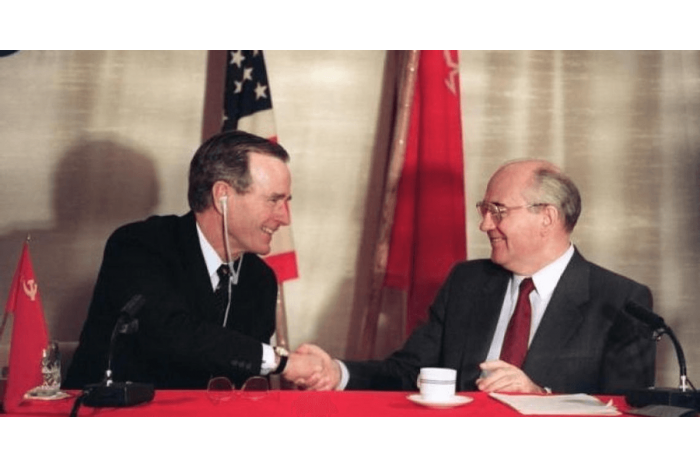Clash of Civilizations (8)
15:11 | 02.09.2022 Category: Interview, Event
The last decade of the existence of the USSR was marked by the deepening of the economic crisis of the socialist economic system. Beyond the triumphalist reports from party congresses, the Soviet economy was in a steady decline. The lack of personal motivation, the ideological planning of the main economic indicators, the monopoly of the party-state on the means of production and, implicitly, the very low productivity of labor made the USSR sell huge amounts of hydrocarbons abroad and buy food and goods from the sea with difficulty consumption. The Soviet man's dream was to buy a consumer item from the West.
Stagnation was the watchword in all fields. And people's lives became more and more boring. The series of deaths of the first people of the party followed, all seriously ill octogenarians. The lack of clairvoyance, but also of political personalities capable of proposing changes, was caused by the strong role of the secret services and the party, at the top of which were also old and conservative people.
But the USSR existed in a dynamic world full of initiatives. One of them certainly hastened the implosion of the Soviet Union. In 1975, the Conference on Security and Cooperation in Europe, later called the OSCE, was formed. This organization, of which the USSR was also a part, had political goals far incompatible with the real situation in the Soviet state. Openness, free movement, human rights - all were in the founding documents of the organization, and they had been signed by the Soviet leaders as well.
Obviously, the USSR was not going to comply with these provisions, but a lot of informal and even clandestine organizations in the Soviet Union demanded their rights formally accepted by Moscow. The Soviet communists were constantly forced to justify themselves, and sometimes even to give in, in order not to be excluded from the OSCE.
However, in 1979 the aging leadership of the USSR made a mistake that would have dire consequences for the country. The Soviets calculated that the crisis in Afghanistan would allow them to strengthen their positions in the region and decide to introduce the Soviet army into this country, after liquidating its leadership. The USSR decided to deal with a multi-tribal, multi-confessional, poor country with a population very aggressive towards foreigners. It was the mistake that accelerated the processes of decomposition of the Soviet system and definitively exposed the imperialist essence of Moscow's foreign policy.
The war in Afghanistan aroused strong anti-militarist protests and tarnished the image of the USSR both internally and externally. Later, the last Soviet leader Mikhail Gorbachev recognized the harmfulness of such decisions. "This (military intervention in Afghanistan) was an unfortunate initiative from the start, even if Russia supported it at the beginning. As in the case of many such projects, it was based on the exaggeration of the threat and some not quite clear geopolitical objectives. Added to this were the unrealistic attempts to democratize a multi-tribal society," said the former Soviet leader.
Meanwhile, in Poland the positions of the communist regime were rapidly weakening. Despite strong measures banning the independent trade union movement Solidarity and imprisoning its leader Lech Walesa, the anti-communist movement was gaining strength. The USSR, even if it also had the project of an invasion on the Hungarian or Czechoslovakian model, was afraid to intervene because Poland had very strong international support, and the population traditionally had a very negative attitude towards the Russians.
The Polish government was forced, in order to temper things, to announce the first free elections since the installation of an autocratic regime.
Gorbachev understood that the lack of reforms in the socialist camp could end in violent revolutions. He chose the path of moderate reforms and had several reasons. First, the USSR was a nuclear country and the military getting out of control could create huge dangers. Second, the union republics were very different nationally, even racially, in terms of their understanding of political systems and democracy and how they saw their future. Thirdly, there was a very strong conservative and anti-restructuring wing within the ranks of the Communist Party, closely linked to the military complex and the secret services. Hence the caution with which Gorbachev promoted the reforms.
The American-Soviet summit in Malta was decisive for the Gorbachev reforms, but also for the destinies of the Eastern European countries, trapped for almost half a century in the diabolical "fraternal embrace" of Moscow. This diplomatic meeting, among other things, also had the purpose of encouraging Gorbachev in his reform approach. The summit was a success, and the consequences of the American-Soviet understandings were felt by everyone.
The Malta summit meant a green light from the West for Gorbachev reforms and opening up to the free world. In the USSR, however, there were powerful forces that were plotting the removal of Gorbachev from power and the return to an authoritarian regime hostile to the West.
Photo: historia.ro

